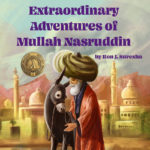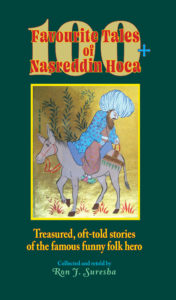From the Author Foreword to “The Immortal Mullah Nasruddin”
by Ron J. Suresha
The wise fool Nasruddin has long been a cherished character in my family’s oral and literary folklore tradition. As a youngster I listened to my mother . . . who spoke conversational Arabic, recount the droll foibles and follies of the bumbling Mullah. His fables, anecdotes, and parables, based in Turkish and Persian folk wisdom, were among the first stories that I learned.
In my twenties, while living for eight years in several ashrams (residential yoga communities) in the United States and India, I heard many more Mullah Nasruddin tales. The stories were frequently used in formal lectures by my teachers and by other meditation students to illuminate, often with comedic effect, the common foolishness and occasional uncommon sense of human nature. This exposure to a broad range of Near and Far Eastern religious and spiritual teachings enriched my understanding of the stories as it increased my appreciation for Sufi culture and philosophy.
. . . For many years, my main literary sources in English for Nasruddin folklore were copies in the ashram library of three popular but dated collections of English-language editions of Nasruddin stories authored by Sufi writer Idries Shah, issued from British publisher Octagon Press. I became hopelessly addicted to Mullah (or “Sheikh”) humor, and sought out more Nasruddin lore in the ashram library, where I spent my few spare minutes copying my favorites by hand.
In 1997, while working as production editor for Shambhala Publications in Boston, I presented a formal proposal for a pocket edition of Nasruddin stories reprinted from the Shah volumes, but Octagon declined the query. From that initial proposal I developed this project, my own contemporary retelling of the Nasruddin corpus.
Based on narratives learned first through oral transmission, over the past fifteen years I collected and indexed several thousand versions of nearly one thousand stories and parables, anecdotes and aphorisms, and jests and jokes of the hapless Mullah. These retellings are based on more than two dozen published sources in English, Spanish, German, French, and Hebrew, including tales presented online but not in printed form, which are referenced in the Bibliography.
Excluding a few longer pieces that incorporate smaller bits, the stories here, told seven at a sitting as per the oral tradition of Nasruddin’s “curse,” are gathered in sevens: seven parts with seven sections each containing seven stories (7³ = 343).
The selections comprise the most popular, amusing, meaningful, and compelling ones repeated among my sources. My goals have been to craft fresh, strong, clear presentations of the folklore, to incorporate the best aspects of each known variation, and to adapt the narrative material to contemporary readership.
. . .
Read the complete Foreword and Introduction by the author in the book: pre-order here.


